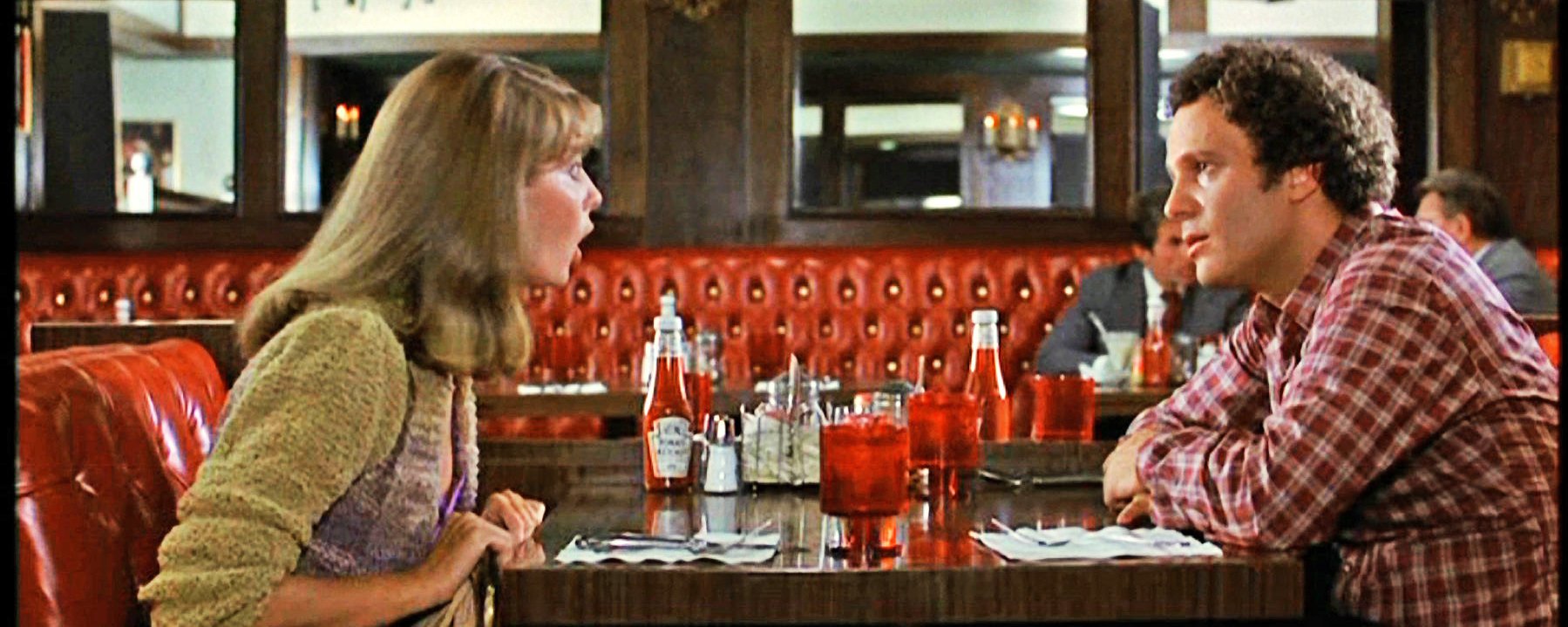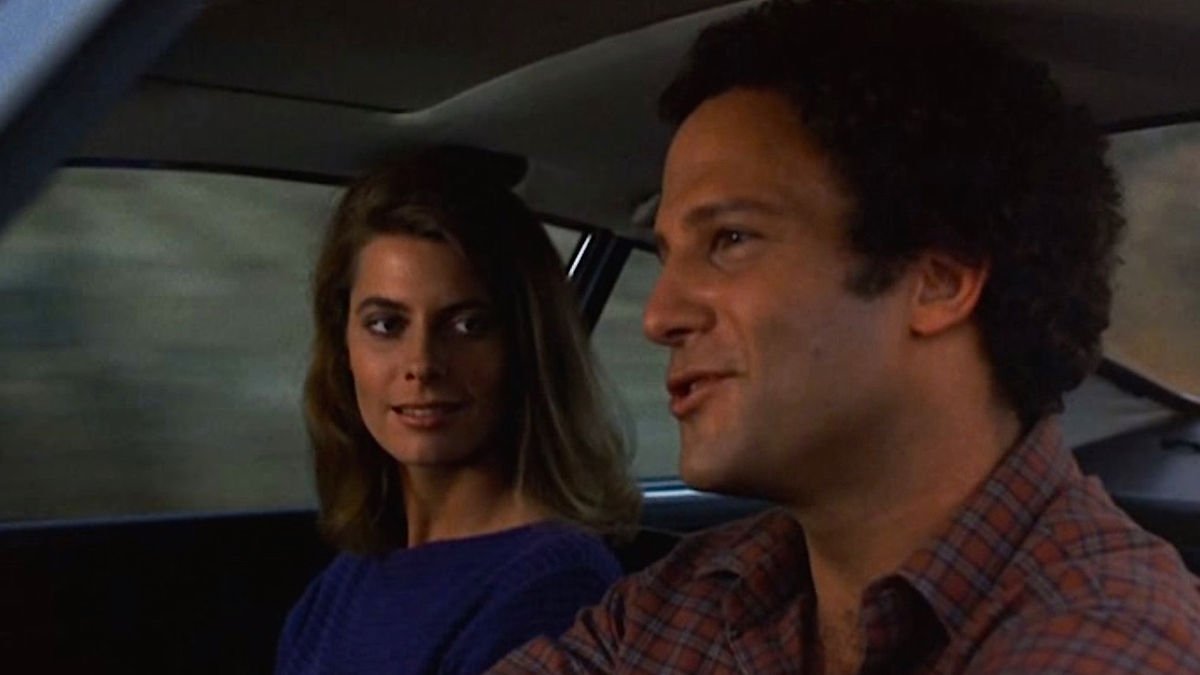Modern Romance is a Goddamn Masterpiece
Since his early days as a pioneering, post-modern stand-up on through to his seminal early short films for Saturday Night Live (one of the few elements of the show’s first season to actually live up to the hype) and then his remarkable, if remarkably non-prolific career as a filmmaker, Albert Brooks has adopted the enormous egos and narcissistic self-delusion of show-business types as his primary satirical subject.
So it is not surprising that Brooks has essentially type-cast himself as show-business folks. In Real Life and Looking for Comedy in the Muslim World, Brooks played a fictional version of himself. In The Muse, Brooks’ weakest film, he played a screenwriter terminally lacking inspiration while in I’ll Do Anything, Brooks stole the film (a misdemeanor, as it turns out) as a Joel Silver-like money-grubbing vulgarian who ends up being the most fascinating and sympathetic character more or less by default.
In 1981’s Modern Romance, meanwhile, Brooks casts himself in a movie-world job seldom seen onscreen. That’s both because audiences tend to prefer seeing movies about onscreen talent and/or demented auteurs and because, honestly, a lot of non-film-folk only have a fuzzy idea of what the job even entails, despite its incredible importance: editor.
Specifically, Brooks plays Robert, the veteran editor of an abysmal science fiction movie starring George Kennedy (as George Kennedy) that seems to be going for antiseptic, Kubrickian chilliness but instead looks like it’s populated by human-sized sperm (think Woody Allen’s Everything You Wanted to Know About Sex and then never think of that movie again) perambulating about empty, white corridors.
Brooks’ brilliant deconstruction of the romantic comedy and the romantic impulse begins, audaciously enough, with the protagonist (Brooks of course) breaking up with girlfriend Mary (Kathryn Harrold), and not for the first time. They’ve had a troubled and mercurial relationship from the very beginning, almost exclusively because our anti-hero is a neurotic lunatic incapable of having a mature, adult, mutually fulfilling relationship, or behaving in a mature, adult fashion outside of work.
I’.m seeing double! Two Brookses!
If you want audiences to root for your hero, this is just about the worst introduction imaginable, especially as Robert exacerbates the off-putting uncomfortableness of the break-up by saying that their relationship is a no-win situation, like Vietnam. That is one hell of a faux pas but judging by what we see of their interactions together it does not seem like an inapt comparison, although if their relationship is more like war than love, Robert is the war criminal and Mary is the innocent bystander.
Being in a relationship with our anti-hero is a no-win situation. He’s incapable of being a good boyfriend and also he does not deserve love, especially with such an attractive, appealing and preternaturally patient woman. Breaking up with his girlfriend sends Robert into an intense funk as he tries to make sense of both his love life and the dreadful movie he’s been cursed with trying to save.
After breaking up with Mary, Robert tries to get some of his mojo back and when that proves unsuccessful, he tries to win Mary back, but he can’t help being his own worst enemy. He thinks he loves Mary, but he also doesn’t really seem to know what love means. The film’s satirical subjects—romance and film—overlap in Robert seeing love largely as a matter of elaborate romantic gestures and stalker-level obsessiveness. As Mary tells an oblivious Robert, that’s a very movie conception of romance, and also one that’s closer to psychodrama than actual love.
Brooks has made a romantic comedy that eschews and subverts the conventions of romantic comedies and a Hollywood satire that eschews and subverts the conventions of Hollywood satire. Brooks focuses in on the dry technical details of the movie-going process in a way that’s both perverse and inspired. In Brooks’ film, movies may begin with rich, beautiful, powerful people (or George Kennedy) enacting melodramatic scenarios on set but they are put together, or made, really, by tired craftsman in drab rooms tasked with making something out of nothing.
Focusing on the least sexy elements of both filmmaking and relationships allows Brooks to attack both subjects from new and revelatory angles. Romantic comedies are almost invariably about two attractive, appealing strangers overcoming obstacles to find true love with each other. Modern Romance, in sharp contrast, is about a man who should never be in a relationship because he’s too jealous and neurotic and self-absorbed to handle it and the perfectly lovely woman he does not court so much as he psychologically terrorizes.
Despite being the female lead, I would guess that Harrold is maybe onscreen fifteen or twenty minutes. The film is less about their actual relationship than with the crazy-making and impossible way Robert projects his fears and insecurities and desires and jealousy onto Mary in a way that renders her actual personality irrelevant. Robert isn’t genuinely interested in Mary so much as he’s interested in his conception of love, and that seems to change dramatically on an hourly basis.
Mary is just unfortunate enough to be on the receiving end of her sometimes partner’s craziness. It’s rare that an ostensible romantic comedy gives audiences so few reasons to root for the central couple to end up together and so many reasons to want them to stay apart.
By honing in on the driest, most technical aspects of filmmaking, like finding the right sound to match a typically dreadful shot, and discovering that the “Incredible Hulk running” clip in your soundboard is completely wrong, Brooks spoofs movies in a way they’ve never been spoofed before. Honestly, there are jokes in Modern Romance that I only got because I wasted my time in college learning about practical filmmaking getting my Communication Arts degree at the University of Wisconsin at Madison.
An editor’s job is to solve problems. He takes the rough material he’s given and transforms it, or at least tries to transform it, into something with an internal logic and pace and momentum all its own, something that makes sense and is entertaining. Robert tries to do something similar in his private life. He’s continually trying to re-imagine and re-shape his relationship into something that makes sense, that is satisfying and strong and sustainable and reflects well upon him. And he never stops screwing up. He’s trying to transform his love life into an appealing, familiar narrative but where he’s decisive in the editing booth, he is terminally indecisive as a boyfriend.
Given the profoundly troubled nature of the central “romance” I don’t think it’s a spoiler to note that the film ends perfectly, with the news that the couple got married, then got divorced, and is now dating again with an eye towards re-marrying. Our neurotic anti-hero/villain is experimenting with different endings, trying to find one that will take and conclude his epic love affair on a satisfying note. He seems doomed to failure but Modern Romance got it exactly right. Brooks made one of the least romantic romantic comedies of all time, and also, not coincidentally, one of the most incisive and honest examples of the often dishonest and gimmicky genre.
I’m on Subtack now! Check out https://nathanrabin.substack.com/ for my brand spanking new newsletter, Nathan Rabin’s Bad Ideas!
Buy the 516 page Sincere Movie Cash-In Edition of The Weird Accordion to Al AND get a free coloring book for just 20 dollars, shipping and taxes included, at https://www.nathanrabin.com/shop and get a free copy of The Weird A-Coloring to Al: Cynical Movie Cash-in Edition free!
Pre-order The Fractured Mirror, the Happy Place’s next book, a 600 page magnum opus about American films about American films illustrated by the great Felipe Sobreiro over at https://the-fractured-mirror.backerkit.com/hosted_preorders
The Joy of Trash, the Happy Place’s first non-"Weird Al” Yankovic-themed book is out! And it’s only 12.00, shipping, handling and taxes included, 23 bucks for two books, domestic only at https://www.nathanrabin.com/shop
Buy The Joy of Trash, The Weird Accordion to Al and the The Weird Accordion to Al in both paperback and hardcover and The Weird A-Coloring to Al and The Weird A-Coloring to Al: Colored-In Special Edition signed from me personally (recommended) over at https://www.nathanrabin.com/shop
Or you can buy The Joy of Trash here and The Weird A-Coloring to Al here and The Weird Accordion to Al here
Help ensure a future for the Happy Place during an uncertain era AND get sweet merch by pledging to the site’s Patreon account at https://www.patreon.com/nathanrabinshappyplace
Y’all know my steez: I make my living largely through Patreon so if you would consider throwing in even a dollar a month over at https://www.patreon.com/nathanrabinshappyplace







